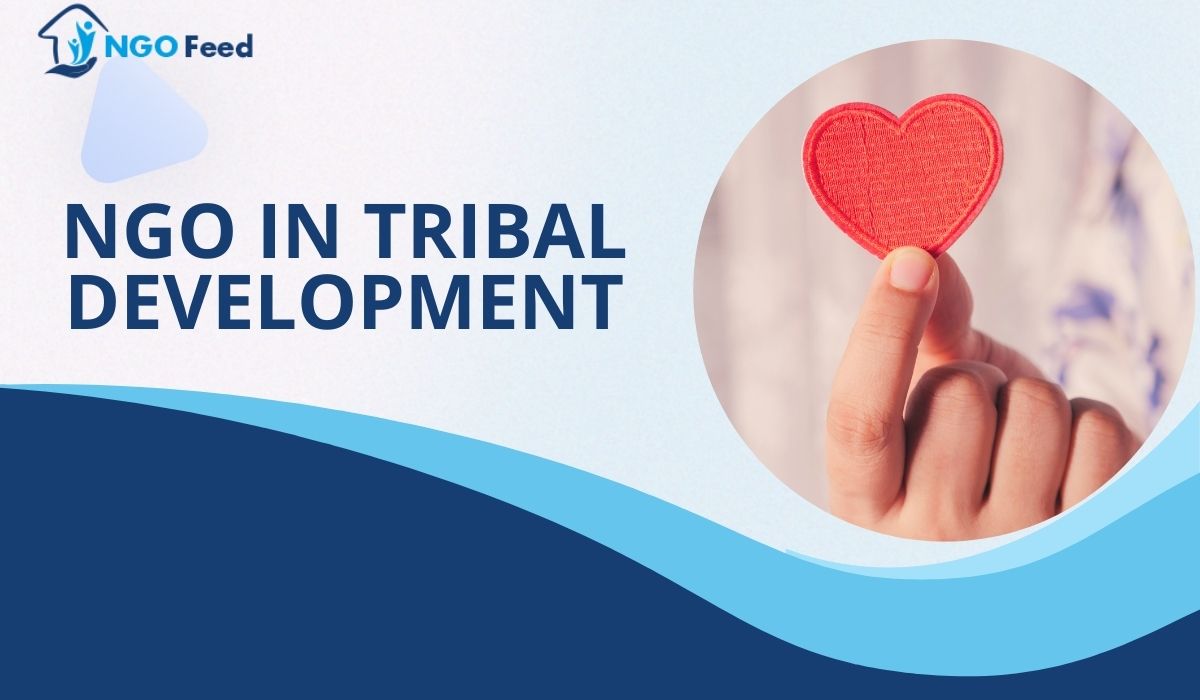NGO in Tribal Development: The tribal communities have been traditionally discriminated against and faced many barriers in regard to development. NGOs are one of the paramount stakeholders in producing and disseminating knowledge about the welfare of tribal groups. This blog will examine the major roles NGOs play in tribes growth.
NGOs are the backbone of tribal development, with dozens of activities and projects aimed at improving and empowering tribal communities. Non-governmental organizations (NGOs) are major players in the process of native people’s development worldwide. The participation of NGOs in this process is multiple-sided.
Why is it Important to Build Tribal Communities of NGOs
In tribal areas with isolation, poverty, and little governmental apparatus, NGOs are crucial transformation and development agents. NGOs have empowered women and improved education, healthcare, livelihoods, and financial access in isolated tribal areas via innovations, collaborations, community participation, and dedicated members.
For holistic tribal development, India requires state-driven structural improvements, not isolated islands of progress assisted by local NGOs. Backward districts with over two-thirds of the tribal population need major development of schools, clinics, all-weather roads, and piped water. Careers outside subsistence agriculture need focus. Exploitative systems that underpay tribals must cease.
Progressive community organisations like tribal cooperatives and village councils need more resources and influence from the state. Government agencies and grassroots NGOs should collaborate to propose large-scale reforms based on field realities. NGOs should be allowed to collaborate more if India wants to mainstream its tribal people.
Roles of NGOs in tribal development
Indigenous communities, who frequently live in isolated and marginalized areas, have several difficulties that can include poverty, poor access to basic amenities, educational inequality, health problems, and social stigmatization. Here, NGOs are key players in the change process, where they closely cooperate with the tribes, the governments, and other stakeholders on behalf of the tribes, their economic status, culture, and general welfare.
One of the main functions of NGOs is the advocacy and representation of the tribes. The non-governmental entities play the role of people’s representatives through multiple platforms, where they campaign for tribal rights, social justice and equitable opportunities. They voice out the community’s grievances, participate in policy-making, and involve wider society in the endeavour of creating a more just and caring society.
Non-governmental organizations mobilize the community and build the capacities of individuals. They equip the tribes by holding workshops, training conferences, and skills development programs to improve their abilities and knowledge in agriculture, healthcare, education, and entrepreneurship. The NGOs ensure this with these programs – enabling tribal community members to be stable and independent. Some of the key roles of NGOs in tribal development include:
Advocacy and Representation
NGOs are the champions of the rights of indigenous people among other citizens; they are agents of knowledge who make the public aware of tribal cultures and the adversities they are prone to. They either protect the interests of the native communities in front of governments and other stakeholders or do so as they request the policies that support their development.
Education and Skill Development
NGOs are designated to improve education in the tribal lands by constructing schools and vocational training centres. Such programs support various forms of literacy and utilize skills development to uplift young tribal lives economically.
Healthcare and Sanitation
NGOs act as catalysts in bringing changes to the healthcare services of tribal communities. They arrange medical camps, set up healthcare centres, and teach decontamination and cleanliness principles to fight against often-spread health problems.
Livelihood Promotion
To improve the socio-economic status of the tribes, NGOs introduce some livelihood promotion programs as a form of intervention. Many of these schemes have targeted sustainable agriculture, handicrafts, and small-scale enterprises to build a sense of independence in tribes.
Land Rights and Resource Management
For NGOs, a strategic way of tackling this issue involves partnering with tribal folks to safeguard their land through the legal process and to try as much as possible to protect their natural resources from exploitation. They help manage a sustainable process of resource provision, providing an even balance of development.
Women Empowerment
This is why NGOs call attention to the prevailing belief that men are the leaders in historical tribal societies and suggest gender equality and women’s empowerment. They design platforms that women can use for training, education and micro-income objectives among the tribal women.
Cultural Preservation
NGOs contribute to the guardianship of specific cultural folk from tribes. They do cultural events, workshops and heritage projects to ensure a major role in traditional practices and knowledge.
Disaster Relief and Rehabilitation
NGOs are ready to respond promptly whenever natural disasters or emergencies occur in tribal communities. In these cases, they ensure food distribution and rehabilitation processes for the affected people, allowing them to go back to their normal lives again.
Capacity Building and Training
NGOs initiate capacity-building training, strengthening community members’ and village leaders’ competencies and knowledge. This makes it possible for them to be involved in and, if necessary, direct the decision-making process.
Advocacy for Policy Changes
NGOs achieve their goal by using research, data analysis and their collective advocacy power to effect changes in the policy at the national and international levels so that tribal issues can be addressed effectively.
Examples of NGOs Worked Successfully
To truly grasp the impact of NGOs on tribal development, let us explore some noteworthy case studies:
The Self-Employed Women’s Association (SEWA) — India
SEWA, an NGO, is seen as the driving force behind female empowerment in Gujarat tribal state in India. By means of skill training programs and creating markets, SEWA has empowered women, making them a source of handmade things, which are internationally known as the crafts of their country.
Survival International — Global
Survival International is a transnational NGO that defends the rights of native people worldwide. Their struggles have resulted in a lineup of notable achievements, encompassing the termination of construction projects that would have damaged the environment and preserving tribal lands.
Key Challenges
Though NGOs recognize that they have been playing a significant role in bringing about development in tribal areas, there are a lot of challenges. Building community activity requires a significant amount of time, as tribals were practically excluded in the past, adversely affecting the articulation of needs and the assertion of their rights.
The issues of diversion of funds, underlining missionary agendas, and not comprehending local cultural sensitivities have been signposted by some NGOs. The insufficiency of grassroots tribal institutions revolving around capacity building to scale endeavour has been considered a challenge, too.
Regulations of foreign funding by the government on project scales and also on effectiveness are another detrimental effect. As the capacities of NGOs are mainly restrained by personnel shortage, expertise and the geographic span, NGO intervention tends to stay in the role of aiding the state but not be able to fully substitute state accountability, especially on the fundamental services such as healthcare, roads, power and water infrastructure. Nonetheless, NGOs continue to be and still remain the very vital instrument of social integration and human development in areas where the Indiastribal hinterlands are located.
Conclusion
NGOs are crucial to tribal development. They are compassionate advocates for sustainable growth, empowerment, and cultural preservation. We can work together to create a world where indigenous communities thrive with dignity and enhance mankind for future generations. Let us support these critical organizations and work together as responsible global citizens to create a more inclusive and fair future. NGOs handle complicated tribal development issues in many ways. They improve tribal life and promote sustainable development via their passion and efforts.



